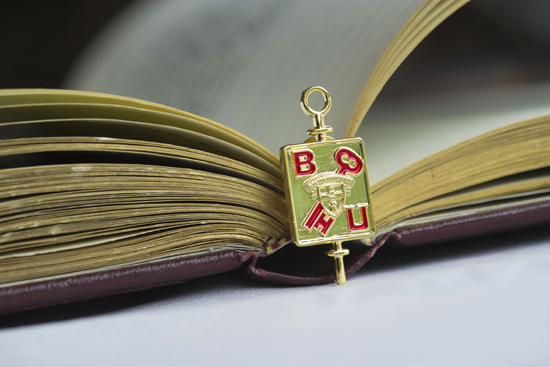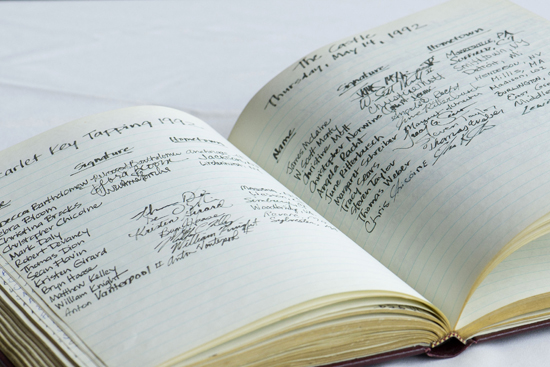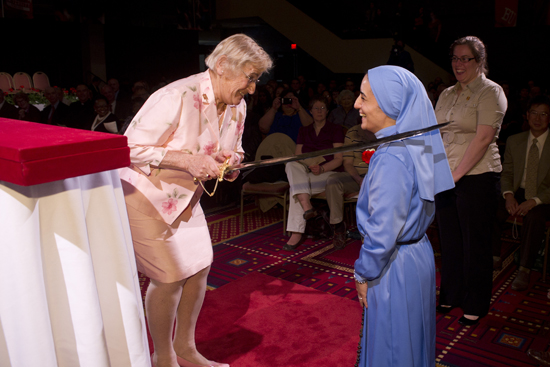Honoring BU’s “Heroes and Sheroes”
Record number of Scarlet Keys to be awarded tonight

The Scarlet Key pin bears the University’s original crest and has remained the same since the society’s inception. Photo by Kalman Zabarsky
Many of this year’s 104 Scarlet Key recipients are seniors who have started or led organizations, captained a varsity sports team, guided service trips around Boston and beyond, or advocated for a cause larger than themselves. They were seemingly everywhere at once, and managed to do it all while posting solid grades.
Tonight Dean of Students Kenneth Elmore will recognize a record-breaking 104 seniors for their exceptional leadership and commitment to service by awarding them the Scarlet Key during a ceremony in the George Sherman Union’s Metcalf Ballroom. They join the ranks of 1,500 alumni who have been recognized by the activities honor society since its founding nearly 75 years ago.
In addition, Honorary Scarlet Keys, which are awarded to alumni, faculty, staff, trustees, and community members, will be given this year to Linda Bondy-Ives, a College of General Studies senior academic advisor, Elliot Driben, the longtime athletics supporter known on campus as the “Mayor of Terrier Nation,” and Karen Jacobs, a Sargent College clinical professor.
Elmore (SED’87) calls Scarlet Key recipients the “heroes and sheroes” of Boston University. “It’s almost like a massive talent search,” he says. “We have found more than 100 people to put on display and say, ‘Here are some great examples for us all in terms of how we live our lives.’”
The Scarlet Key dates back to 1938, when seniors Leland Potter (CAS’38, GRS’38), Donald Livingston (SMG’39), and William Coombs (SMG’39) created an “honorary society for outstanding students in extra-curricular activities” who were “dedicated to the promotion and coordination of an all-University consciousness through student activities,” according to the 1939 yearbook, The Hub. The society had a color (scarlet), flower (scarlet carnation), jewel (ruby), and motto: Ad Astra per Aspera (“Through hardships to the stars”).
“It was the most coveted nonacademic honor that could be given to a student,” says Jane O’Hern (SAR’54), a School of Medicine professor emerita of mental health counseling and behavioral medicine, who earned her key in 1953.

Only 17 seniors and juniors formed the charter society. The junior members, and their future protégés, carried the student organization forward each year. O’Hern recalls sitting on the admissions committee and spending 12 hours sorting through stacks of student applications and assigning points to each individual’s achievements. Nothing, she says, escaped their attention.
“If you said you were a vice president and you weren’t, there was somebody who knew it,” O’Hern says. “There had to be somebody from every school and college present. It was real quality control.”
In the early days of Scarlet Key, editors of The Hub and the student newspaper were guaranteed admission, as were any All-American athletes—among them BU football legend Harry Agganis (SED’54), who was also a baseball star and went on to play for the Red Sox. Otherwise the committee selected a total point score and those who reached it were awarded the coveted Scarlet Key. Those who didn’t, well, “tough cannolis,” O’Hern says. “Otherwise it got personal.”
“If you really look back at some of the people who made it,” she adds, “you would find that they ended up on our Board of Trustees, because they were the student leaders.”
In the society’s first years, Scarlet Key members notified future recipients by searching them out on campus, “tapping” them on the shoulder, and giving them an invitation to the induction ceremony. But as the society tripled in size, that tradition died off and was replaced by a letter. Today, an email is sent to new members.
The first induction ceremony was held at the Women’s Building at 146 Commonwealth Ave., now the Fisk House for women graduate students. The event later moved to Marsh Chapel and the Castle. New members signed a leather-bound maroon book (still used today) with Scarlet Key written in gold and the University’s original crest below. They received a certificate, or “shingle,” and a gold lapel pin with a scarlet key slanting diagonally across the front, between the letters “B” and “U.”
The society initiated new members each spring and fall and sponsored a semiformal dance at the home of the University president. Members also served as hosts for University events, much like President’s Hosts today.

Yearbook pictures of the society reveal how it changed over time. In the mid 1940s, most members were women, as men were sparse on campus during World War II. The first minority students can be seen in group shots in the 1960s. And by the next decade the suits and prim dresses of early members had been replaced by the long hair and bell-bottoms endemic to the early ’70s.
Student unrest and the political tumult of the Vietnam era made organizations like Scarlet Key less popular and—in the eyes of some during that period—less relevant, so in 1972 the Scarlet Key society dissolved. “Society’s attitudes at that time were a bit different and the traditional wasn’t necessarily something that was exalted,” Elmore says. “There was more of a conversation about activism.”
“We threw out everything that was old,” says Carolyn Cohen (SAR’65), a 1998 honorary Scarlet Key recipient. “There were riots on campus. It was just simply a time of unrest, and everything that was traditional was tested or thrown out.”
Nearly a decade passed before past Scarlet Key recipients within the General Alumni Association (now the BU Alumni Association) revived the society, in 1979, “as an honor awarded to outstanding seniors who have demonstrated exceptional leadership in student activities and organizations, service to their school or college, and scholarship.” Since 2004, Scarlet Key has been overseen by the Dean of Students Office.
Today, BU faculty and staff nominate potential Scarlet Keys every spring. Jack Weldon, associate dean of students, chairs the committee and spends an entire day sorting through mounds of applications, résumés, and letters of support with nearly a dozen colleagues from the Community Service Center (CSC), the Student Activities Office, Athletics, and the various schools and colleges. This year, he received 150 nomination packets.
“It’s ample testimony to the vibrancy of student life at Boston University, and without question underscores the fact that student life at BU is strong and flourishing,” Weldon says. “I’m just so overtaken with how strong these students are and what great contributions they’ve made to life at BU.”
He’s referring to people like Fernando J. Limbo III (CGS’10, SAR’12) and Elena Acuna (CAS’12, COM’12). Limbo served in the College of General Studies student government, was president of the Catholic Center, sang in the Inner Strength Gospel Choir, performed in BU on Broadway, and was a resident assistant at Myles Standish Hall. Acuna was president of the student organization I Embrace You, worked as a College of Arts & Sciences Dean’s Host and a First Year Student Outreach Project staffer, volunteered in the CSC program Student Studio, and was a CAS peer advisor.
Limbo and Acuna are among the 104 seniors being inducted this year as Scarlet Keys, a sharp increase from generations ago. Some past recipients have expressed concern that the current high numbers dilute the society’s elite nature.
“We’re not trying to be elite,” counters Elmore. “I think we’re trying to recognize, and that’s important. We are acknowledging those folks who have done some pretty fascinating and wonderful work for this community. And if that means it’s more than 100 people, well, it is.”
Elmore also points out that the University is a different place from the commuter school of 1938. Now roughly 16,000 undergraduates walk the campus. Choosing 100 seniors among them, he says, hardly diminishes the key’s prestige.

Tonight Scarlet Key inductees will be escorted, as they were in 1954, by a past recipient. The ceremony is now held in the Metcalf Ballroom before an estimated crowd of 1,000 people. Elmore will read the names of each inductee and list their many accomplishments as they pass through three stations.
First, seniors will sign their name in the Scarlet Key book, whose gold-rimmed pages carry the signatures of nearly every past recipient, some of whose addresses or last names have been crossed out and amended to reflect a move or a marriage. Ink-stained fingerprints smudge the margins of some pages. The hometowns listed also reflect the changing demographics of both BU and Scarlet Key. Nearby cities and towns like Medford, Mass., Keene, N.H., and Hartford, Conn., now appear alongside farther-flung communities like San Jose, Calif., San Antonio, Tex., Milwaukee, Wis., and even cities and towns in India.
During tonight’s ceremony, Elmore or a past recipient will then “tap” the new members on each shoulder with a sword. That’s right—a real, shiny, gold-and-diamond-encrusted sword from the vaults of the Howard Gotlieb Archival Research Center, where it remains under wraps in a scarlet box the rest of the year.
Seniors become official Scarlet Keys once they receive their pin and a framed certificate.
And there’s one more surprise awaiting tonight’s inductees: one lucky senior will receive the Leila Saad Award, which honors the “most scarlet of the Scarlet Keys” with a $1,000 prize.
With more than 100 people being honored, the Scarlet Key reception promises to be a marathon event. But Elmore isn’t concerned. In fact, he’d like to worry about finding a space larger than the Metcalf Ballroom to fit future recipients. “What a strange and wonderful problem to have,” he says.
The Scarlet Key Society ceremony is tonight, May 17, at 6 p.m., in the Metcalf Ballroom, 775 Commonwealth Ave. All are welcome. View a complete list of this year’s inductees online.
Comments & Discussion
Boston University moderates comments to facilitate an informed, substantive, civil conversation. Abusive, profane, self-promotional, misleading, incoherent or off-topic comments will be rejected. Moderators are staffed during regular business hours (EST) and can only accept comments written in English. Statistics or facts must include a citation or a link to the citation.